Books
Books
in random order

Engagement Arts Zine #1
First edition of the Engagement Arts Zine.
Published May 2019
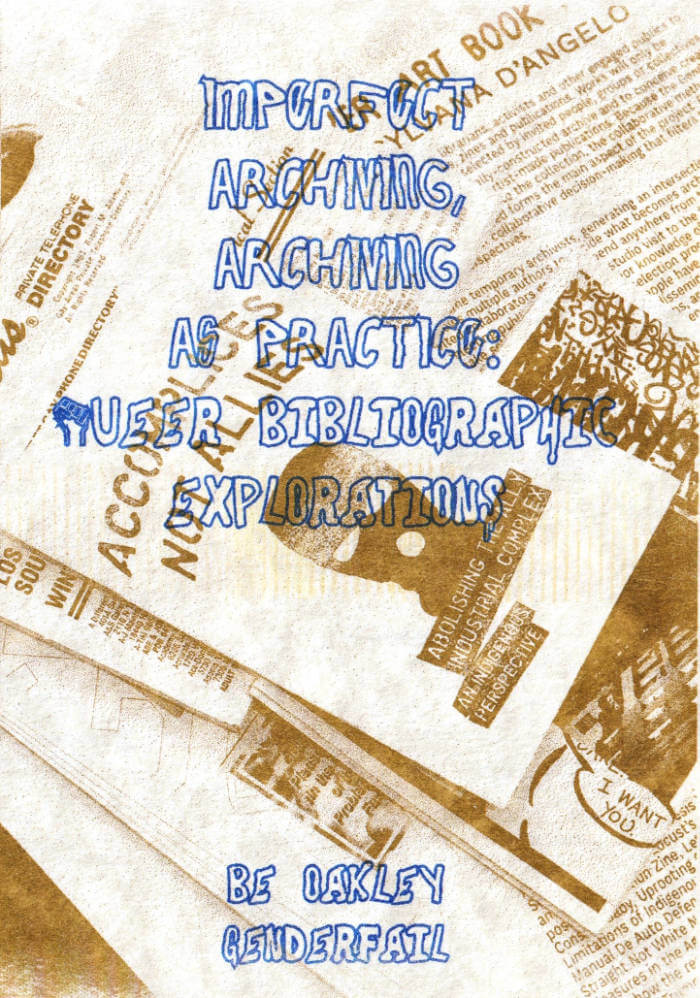
Imperfect Archiving, Archiving as Practice: Queer Bibliographic Explorations
Imperfect Archiving, Archiving as Practice: Queer Bibliographic Explorations is a special expanded 5th edition centering on archiving as artistic practice. This manifesto talks to the core of GenderFail collecting and archiving practices that look to the softness as a metaphor for the material and content of artist-made publications. The GenderFail Archive Project is a socially engaged reading room that looks at archiving as practice. The project stems from GenderFail’s desire to share the publications from their personal library archive and give a platform to other publishers that they cherish. This publication features and highlights over a hundred artist books, art books, and zines.
This edition features a new section previously unpublished, showing bibliographies created for exhibitions and programs with the GenderFail Archive project at spaces such as Wendy's Subway, The Studio Museum of Harlem, and Cleveland Institute of Art's Reinberger Gallery.
This publication also features the 4th edition featured section showing seven curated GenderFail Archive Project reading lists from “Publishing Now,” a class I taught from 2021-2023 at the School of the Museum of Fine Arts at Tufts University. For this course, I wanted the students to read zines and publications being produced in real-time, so I started to digitize my collection as I acquired specific titles that I felt the students would resonate with. Many of the readings for this course were scanned from my collection of over 2,000 zines, artist books, and art books that make up the GenderFail archive. Since we could not meet in person (due to the pandemic), I spent hours scanning zines and artist books to be used as required readings for the course. Each reading list will accompany a link and QR code to read and engage with the complete scanned copies of all 31 featured artist books, art books, and zines.
The Imperfect Archiving, Archiving as Practice: Queer Bibliographic Explorations, is among my most cherished project I’ve published of the over 125 editions I’ve designed and printed with GenderFail.

Poetry, or else...
The poet, the unknown being… a loony, a dreamer, a hermit. The poet writes poetry… but really, what is poetry? Arts, politics, mere amusement?
This little book is an insight into the mindset of someone who just can’t help but to be a poet. It is a manifesto for the freedom of thought and expression, an essential source of motivation and inspiration for readers and writers alike.
Anisur Rahman (b.1978) made his poetic debut in 2003. As a journalist, translator and playwright he has further contemplated the poetic mind. Born in Bangladesh, he writes in both Bengali and English, but nowadays lives exiled in Sweden.

DEARS No. 5 ever:over
Robert Steinberger, Delphine Chapuis Schmitz and 1 more
DEARS is a print magazine for transversal writing practices at the crossroads of art, poetry and experimental writing. It brings together authors and writers from different backgrounds and constitutes a dedicated platform for texts escaping the usual genres and disciplinary boundaries.
DEARS promotes the exploration of new forms of language as a way to foster new forms of living together, and emphasizes the growing relevance of trans- versal writing practices in this respect.
DEARS no. 5 / Summer 2023 / ever.over
With texts by Diaty Diallo, Douglas Keaney, Dzifa Benson, Sevinç Çalhanoğlu, Jana Vanecek, and an epigraph by Trinh T. Minh-ha.

Ticking Stripe
A new collection of writings by the composer and mathematician Spencer Gerhardt, considering among other topics the rich points of contact between minimalist musical aesthetics and intuitionistic mathematics.
Noted composer and mathematician Spencer Gerhardt presents Ticking Stripe, a groundbreaking collection of essays linking notions of continuity and construction across the boundaries of math, art, music and philosophy. Gerhardt offers new, and deeply informed interpretations of the 1960s New York avant-garde, viewed through the lens of trailblazing artists such as La Monte Young, Marian Zazeela, Catherine Christer Hennix, Henry Flynt and Tony Conrad.
Ticking Stripe pairs the spirit of L. E. J. Brouwer—a mathematician who brilliantly, and controversially, sought to reconstruct the continuum in his own philosophical terms called intuitionism—with the ambitions of pioneering minimalists who combined continued constructions, idealized processes of introspection, and conceptual world-building with a host of philosophical, scientific, and spiritual concerns. Informed by his own work as a professional mathematician and composer, Gerhardt explores the depths of these disparate traditions, finding unlikely areas of commonality. Spanning over two decades, these essays feature rich historical explorations of minimalist music, writing on contemporary art, and work in logic and algebraic groups, all approached with rare clarity and technical aplomb.
Spencer Gerhardt is a composer and mathematician. His music engages constructive, introspective and romantic traditions. Gerhardt has written solo piano music, piano based songs, and works of minimalism. He studied raga with La Monte Young and Marian Zazeela, piano performance with Sung-Hwa Park, and has collaborated with artists such as Thomas Ankersmit and Charles Curtis.

Histoire de la séparation
Pour les révolutionnaires des deux derniers siècles, l’accumulation du capital devait unifier la classe ouvrière sous la bannière du sujet révolutionnaire. Le mouvement ainsi né était appelé à renverser la société de classes et les clivages divisant les prolétaires. Mais le mouvement de la valeur a finalement triomphé, pour donner naissance à la société de la séparation. L’atomisation a pris le pas sur les puissances du rassemblement. La civilisation du capital traverse aujourd’hui une crise sans fin, mais les forces capables de la défaire brillent par leur absence.
Ces textes tirés de la revue Endnotes, réunis pour la première fois en français, dessinent la carte d’un présent ponctué de paysages désindustrialisés, de centres logistiques et de bidonvilles où s’entassent les populations rejetées aux marges de l’accumulation – autant de coordonnées nécessaires pour continuer à penser le dépassement du capitalisme : une fois encore, reprendre le chantier de l’hypothèse communiste.
Endnotes est une revue théorique communiste produite par un groupe de discussion du même nom basé en Grande-Bretagne et aux États-Unis.
Traduction: Pablo Arnaud
Préface: Aaron Benanav Et John Clegg

That's Me!
David Hoyle (b.1962, Blackpool, United Kingdom) is a performance and visual artist. His work over the last 30+ years has referenced gender, politics, identity, mental health issues and the ongoing fight for equality.
Hoyle came to prominence in the ‘90s as The Divine David, a kind of anti-drag queen whose lacerating social commentary – targeting both bourgeois Britain and the materialistic-hedonistic gay scene, which he called, “the biggest suicide cult in history” – was offset by breathtaking instances of self-recrimination and even self-harm. Following a couple of outré late-night Channel 4 TV shows and a part in the movie Velvet Goldmine, directed by Todd Haynes, Hoyle killed off The Divine David, during a spectacular show at the Streatham International Ice Arena in 2000 and retreated to Manchester for “a period of reflection”.
He returned to television screens in 2005 in Chris Morris’ Nathan Barley, then began performing live again, under his own name. Hoyle’s biting satire, bravura costumes, wicked comic timing, and compelling charisma remained intact.
Hoyle is also a prolific painter often painting in his live shows. His paintings are deeply personal, and tackle the same themes as his performances, incorporating domestic waste, flyers, newspapers, magazines, wrapping paper, and more, which reinforce his disdain for the ruling-class bourgeoisie.
This is the first book dedicated to Hoyle’s paintings, offering an edited selection of works made between 2010 and 2022. At Hoyle’s request, all of the works are published undated: thus, emphasising their timelessness, timeliness, relevance, and urgency to the desperate age in which we now find ourselves!

Witches, Witch-Hunting and Women
The world is witnessing a new surge of interpersonal and institutional violence against women, including new witch hunts. This surge of violence has occurred alongside an expansion of capitalist social relation. In this new work, Silvia Federici examines the root causes of these developments and outlines the consequences for the women affected and their communities. She argues, that this new war on women, a mirror of witch hunts in 16th- and 17th-century Europe and the "New World," is a structural element of the new forms of capitalist accumulation. These processes are founded on the destruction of people's most basic means of reproduction. Like at the dawn of capitalism, the factors behind today's violence against women are processes of enclosure, land dispossession, and the remolding of women's reproductive activities and subjectivity.
Silvia Federici is a feminist writer, teacher, and militant. In 1972 she was co-founder of the International Feminist Collective that launched the campaign for Wages for Housework internationally. Her previous books include Caliban and the Witch and Revolution at Point Zero. She is a professor emerita at Hofstra University, where she was a social science professor.

The Contemporary Condition - Contemporaneity in Embodied Data Practices
Cornelia Sollfrank, Felix Stalder
What parallels are there between a human pranayama practitioner and a migratory bird in heavily datafied environments? In Contemporaneity in Embodied Data Practices, two artistic field studies provide the starting point for a dialogical reflection on the entangling of diverse temporalities in body-related, datafied, and experiential practices. Shifting through biological, historical, and technological rhythms, Cornelia Sollfrank and Felix Stalder unfold their respective more-than-human frames of reference and arrive at specific forms of agency in the contemporary moment. Published in partnership with the Centre for Research in Artistic Practice under Contemporary Conditions at Aarhus University.
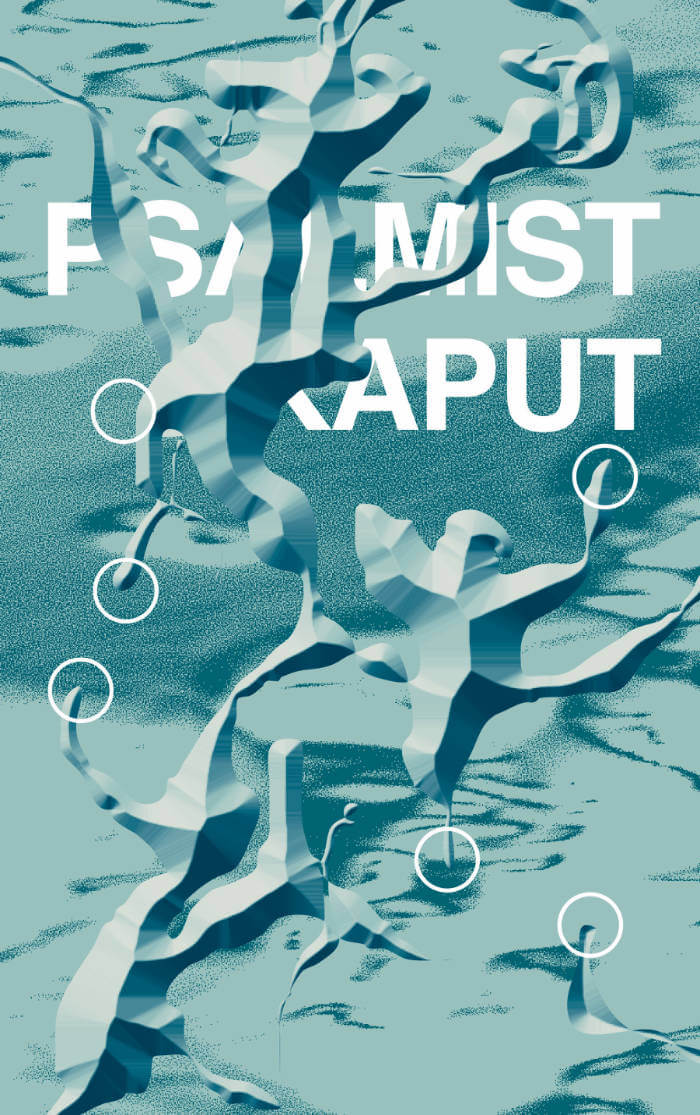
Psalmist Kaput
Through the harsh noise of reality, a signal appears. At first faint, but slowly, as we approach, it grows louder, more defined. Aerial photographs depict odd structures and garbled sounds, blurred images of decaying media, alien architecture. It calls out your name.
Psalmist Kaput lures the reader into a misama of fragmented speech, disembodied voices, deteriortating thresholds, and lo-res nightmares. Fusing text and image, it is a work undefinable and wholly its own.
Enter the exclusion zone, witness its monuments, and if you're able, find your way back out again. "Soon we will all be submerged."

The Poeticians

Rage Assassine: Mettre Fin au Racisme
Avant que Black Lives Matter et #MeToo ne viennent secouer l’Amérique et le monde occidental, bell hooks montrait, dans cet essai incisif, que l’abolition du racisme et l’éradication du sexisme vont de pair. Sans le féminisme, la lutte antiraciste reste une affaire d’hommes. Sans l’antiracisme, le féminisme s’expose à servir de courroie aux logiques de domination raciale. L'autrice insiste sur le bien-fondé de la rage qui anime les masses populaires et la jeunesse noire et sur la nécessité d’en faire un moteur de changement social radical. Elle propose une théorie et une pratique révolutionnaires, dont la fin est une communauté solidaire fondée sur l’égalité réelle et la volonté de tou.te.s de travailler au changement.
Traduit de l'anglais par Ségolène Guinard.
GLORIA JEAN WATKINS, connue sous son nom de plume BELL HOOKS, née en 1952, est une intellectuelle, féministe, et militante étasunienne. Elle a publié plus de trente livres et de nombreux articles, et est apparue dans plusieurs films documentaires. Traduits dans de nombreuses langues, ses ouvrages sont considérés parmi les plus importants sur la question aux Etats-Unis et suscitent un réel engouement en France depuis quelques années. Les éditions divergences ont déjà traduit et publié trois de ses ouvrages dont La volonté de changer et A propos d'amour.

Angst
In 1942, butcher Heinrich Angst started to set up his own business in Zurich. Today, Angst AG operates the municipal abattoir and supplies catering businesses and butchers throughout the canton. Angst is a book documenting an installation with 50 used and framed sausage wrapping papers presented at Fondation Fernet Branca in Saint Louis, France. On the other hand the book is gathering 50 systemically relevant poems surrounding writing, everyday life as a dance with obligation and panic, a society without children, fear as a fundamental quality of life and hopefulness to bury fear together.
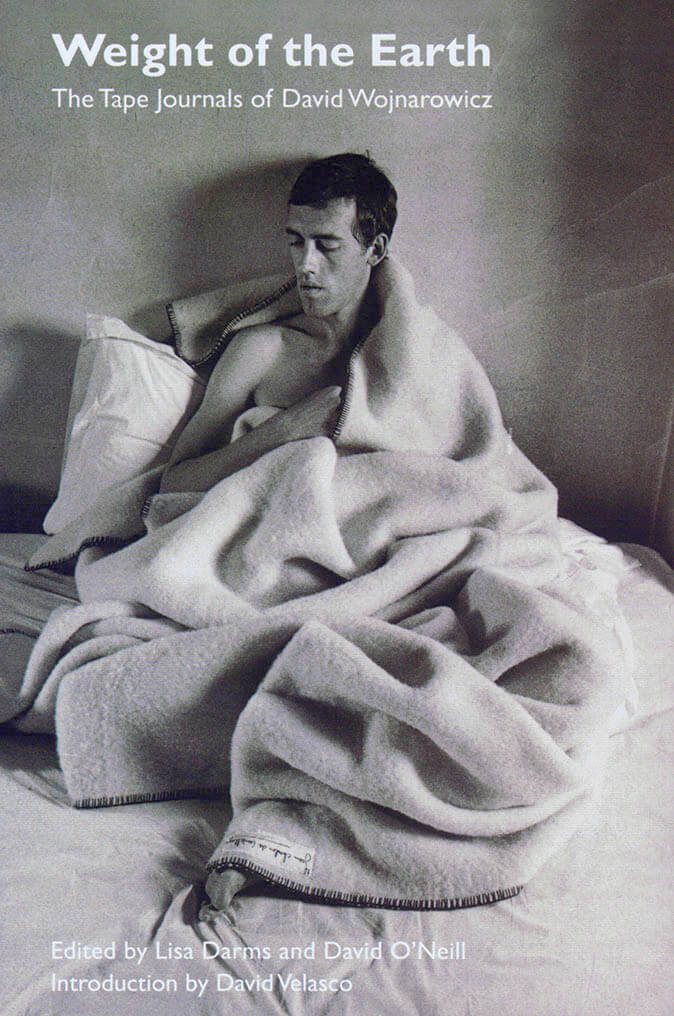
The Weight of the Earth
Audio journals that document Wojnarowicz's turbulent attempts to understand his anxieties and passions, and tracking his thoughts as they develop in real time.In these moments I hate language. I hate what words are like, I hate the idea of putting these preformed gestures on the tip of my tongue, or through my lips, or through the inside of my mouth, forming sounds to approximate something that's like a cyclone, or something that's like a flood, or something that's like a weather system that's out of control, that's dangerous, or alarming.... It just seems like sounds that have been uttered back and forth maybe now over centuries. And it always boils down to the same meaning within those sounds, unless you're more intense uttering them, or you precede them or accompany them with certain forms of violence.
—from The Weight of the Earth
Artist, writer, and activist David Wojnarowicz (1954-1992) was an important figure in the downtown New York art scene. His art was preoccupied with sex, death, violence, and the limitations of language. At the height of the AIDS epidemic, Wojnarowicz began keeping audio journals, returning to a practice he'd begun in his youth.The Weight of the Earth presents transcripts of these tapes, documenting Wojnarowicz's turbulent attempts to understand his anxieties and passions, and tracking his thoughts as they develop in real time.
In these taped diaries, Wojnarowicz talks about his frustrations with the art world, recounts his dreams, and describes his rage, fear, and confusion about his HIV diagnosis. Primarily spanning the years 1987 and 1989, recorded as Wojnarowicz took solitary road trips around the United States or ruminated in his New York loft, the audio journals are an intimate and affecting record of an artist facing death. By turns despairing, funny, exalted, and angry, this volume covers a period largely missing from Wojnarowicz's written journals, providing us with an essential new record of a singular American voice.
Published 2018
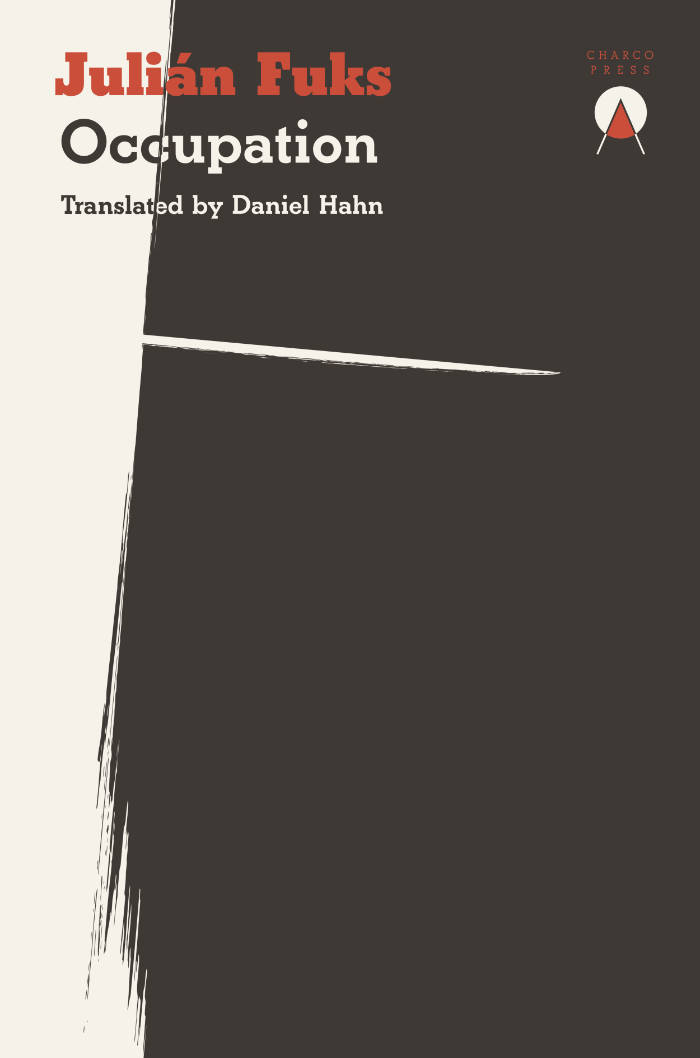
Occupation
Known and celebrated in Brazil and abroad for his novel Resistance, Julián Fuks returns to his auto-fictional alter ego Sebastián in a narrative alternating between the writer’s conversations with refugees occupying a building in downtown São Paulo, his father’s sickness, and his wife’s pregnancy. With impeccable prose, the author builds associations that go beyond the obvious, not only between glimpsing a life's beginning and end, but also between the building’s occupation and his wife's pregnancy — showcasing the various forms of occupation while exposing the frailty of life, the risk of solitude and the brutality of not belonging.

Myth Lab: Theories of Plastic Love
Myth Lab: Theories of Plastic Love is a genre-defiant sex-trip to post-human dimensions. If C.G Jung, magic-mushroom shaman Terence McKenna and Camille Paglia (Sexual Personae) had a three-way while binging on George Bataille and undergoing Hormone Replacement Therapy, their baby might be the erotic cocktail of Myth Lab. Its extreme theme is nothing less than the fate of the species.
“Brilliant and wild, Jack Skelley’s Myth Lab is a manifesto of exuberance disguised as a sci-fi sex test-center for the invention of communal futures. Skelley’s a mad scientist, scholar and poet.” - Chris Kraus, author of After Kathy Acker
“In Myth Lab, Jack Skelley adroitly molds an “Einsteinian elasticity between objects and ether” to the “clitoverse.” If this formulation seems too vast, just think about a) the last time you felt good about power and b) all the ways to say yes to pleasure as a source of liberation. In conducting a “cosmologic psychoanalysis,” Myth Lab thrillingly hot wires our neurons to an endless mirror stage reflective of our own instinctual nature.” - Kim Rosenfield, author of Phantom Captain
"An explosion of clit-cock-and-pop-culture worship. Skelley’s eroto-celestial universe fights back not only against the denial of desire – “also known as fuckheadocracy and market forces” – but against death itself." - Francesca Lia Block, author of Weetzie Bat
"A hallucinatory book that straddles gender studies, science-fiction, and cultural criticism (to name but three of many genres). Ever eager to use a newfound Skelley-ism, I urge everyone to read Myth Lab and be “Kardashian'd” with love (i.e buy it now, it's great)." - Susan Finlay, author of The Jacques Lacan Foundation
"In Jack Skelley’s Myth Lab, something weird and beautiful is forged in the crucible of infinite horny grief. It’s an epic, delirious descent into the inferno, navigating the concentric circles of romance and desire as literary malady, TikTok psyop, benevolent cosmological principle, and more. Simultaneously a quest, a physics experiment and an elegy. I loved following its narrator - a tender, erotomanic, Blakean particle - seeking and finding visionary head." - Daisy Lafarge, author of Love Bug
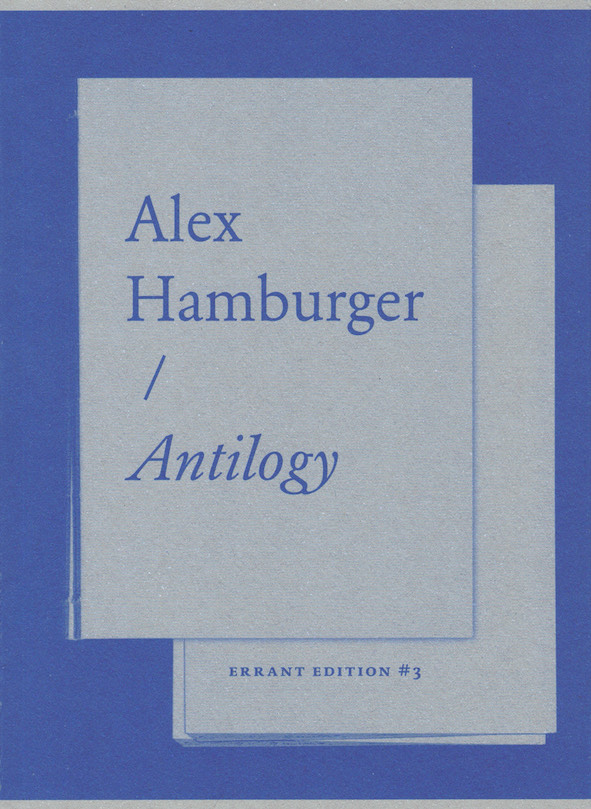
Antilogy
Drawing from notions of "bad poetry" as the critical undoing of normative taste, Antilogy brings together works by the Brazilian artist and poet Alex Hamburger.
Central to Hamburger's practice and engagement with poetry is a focus on writing as the expression of a performative disruption and playful reworking of semiotic systems. With references to Fluxus intermediality, Brazilian concretism, experimental music, and sound poetry, Hamburger's work dynamically collapses the distinctions between fact and fiction, theory and performance, system and noise. From visual poems to abstract narrative to personal fantasy, Antilogy reminds us about the potent sense of refusal and experimentation that all art should carry.
Alex Hamburger was born in Belgrade, Serbia, in 1948. From the 80s onward his researches and proposals turned to the possibilities of fusion and intertwining of languages, developing works in Verbal, Visual and Sound Poetry, Object-Poem, Artist's books, Installation, Performance art, etc. He has published seven books in various poetical genres, three CDs of Sound Poetry and has performed several performance pieces, some in partnership with the visual artist Marcia X, with whom he established a fruitful relationship throughout the 80s, contributing decisively for a better understanding and acceptance of the above practices in the local art circuit of Rio de Janeiro. His work is held in the collections of contemporary art institutions, in Brazil and abroad, including The Museum of Modern Art, RJ, The Museum of Modern Art, SP, Printed Matter Bookstore, New York, Compendium of Contemporary Fine Prints, Hamburg, ICA, London among others. Alex Hamburger continues to live and work in Rio de Janeiro, Brazil.


Honey Volume 2
Mars Dietz, Opashona Ghosh and 1 more
HONEY is a zine meditating on the experiences of friendship.
Volume 2 was edited by Mars Dietz, Opashona Ghosh and Dylan Spencer-Davidson—each inviting contributions from friends.
Following vol. 1’s optimism about the underappreciated potentials of friendship, vol. 2 marks a noticeable turn towards friendship's messier sides. Letters to deceased friends, childhood social complexities, unrealised sexual desire, pushback against the overfetishisation of queer kinship, and more.
Contributions from Azul De Monte, Ana Božičević, D Mortimer, Adriana Disman, Pelumi Adejumo, Iggy Robinson, Clay AD, To Doan, Edward Herring, marum, Lou Drago, Aisha Mirza, Iga Świeściak, Roya Amirsoleymani, George Lynch, Emily Pope and Kari Rosenfeld.
Original artworks by Opashona Ghosh and Iga Świeściak, and featuring artworks by Azul De Monte and Emily Pope.
Riso printed on recycled paper with Pagemasters (London).

Evol/Love
Evol/Love is a project in three parts: a billboard series, installation and publication connecting 160 subtitled movie stills that all contain the word Love.
A collage of voices and definitions arranged in alphabetical order, from ‘Love is where you find it’ (A: A Date with Judy, US 1948, 00:22:37) to ‘But even if it’s a little late, love has a way of coming back to you’(Y: Yeonae/Love is a Crazy Thing, KR 2005, 01:38:02), but read backwards to sound like its antonym: evil.
Self-published: Stichting Mei, Amstelveen, NL 2020
19,6 x 19,6 x 2,3 cm
200 pages, 160 images
Japanese bound, buckram cover with flaps
Offset on pink paper (interior), screenprinted buckram (cover)
Graphic Design Vilmantas Žumbys, Vilnius
Edition of 666 copies

Pages 9 - Seep
Babak Afrassiabi, Nasrin Tabatabai
This issue of Pages assumes seep as a post archival mode: in the Merriam-Webster dictionary the verb 'seep' is translated as follows: to flow or pass slowly through fine pores or small openings, to enter or penetrate slowly, to become diffused or spread.
The biology or politics of seeping is like that of raw petroleum oozing at natural oil seeps. Unlike refined oil which has sponsored modernization and its aligned archives, crude oil pours beyond historical purpose and defies structural elevations. It instead disfigures the ground through which it dubiously spreads.
Seeping is a posthumous affair. It is the gradual leaking of a long withdrawn interior. Like the bleeding of a punctured corpse, when the pumping of the heart has stopped, when the body is lifeless and apathetic to any 'hail', yet continuing to bleed. Seep as archive is an eternally post-apocalyptic expansion, retraction, deviation, subtraction, or simply the arrival of (non-)things.
With contributions by:
- Mariam Motamedi Fraser / Geo-Archive
- Richard Goldstein / Dennis Oppenheim's Dilemma: Should he Sell Art to the Shah?
- Babak Afrassiabi, Nasrin Tabatabai / Contemporary Hole / Unfilmable
/ Seep
- Saleh Najafi / Wounds of Archive¹
- Mark von Schlegell / The Artist Abstract #6
- Nima Parzham / The underground
- Adam Kleinman / Vanished Theories
- Suzanne Treister / Algorithm
- Alexi Kukuljevic / The Dissolute Subject
- Matts Leiderstam / Andy Warhol, Suicide (Purple Jumping Man), 1963
- Eugene Thacker / Black Infinity; or, Oil Discovers Humans
- Vivian Ziherl, Natasha Ginwala / Infrastructural Suspensions: Global Spanning, Atmospheric Seepage and Measures of the Undecidable

Loving Corrections
Ethical, pondering, and wondrous, adrienne maree brown’s Loving Corrections is a collection of love-based adjustments and reframes to grow our movements for liberation while navigating a society deeply fractured by greed, racism, and war. In this landmark book, brown invigorates her influential writing on belonging and accountability into the framework of “loving corrections”; a generative space where rehearsals for the revolution become the everyday norm in relating to one another.
Filled with practical wisdom on how to be a trustworthy communicator while providing bold visions for a shared future, Loving Corrections can speak to everyone caught in the crossroads of our political challenges and potential. No matter how new to the struggle, or how numerous our failures, brown’s indispensable writing is an invitation to us all. Includes an afterword by Janine de Novais.

The Close Chaplet
Long out of print, The Close Chaplet is Laura Riding's first book, originally published in 1926. Riding deliberately ceased writing poems after 1940, when she came to see poetry as irrevocably flawed as a means of expression. These poems demonstrate Riding's early desire to depart from the close and well-tilled ground of traditional lyric poetry. According to her biographer, Elizabeth Friedman, many of the poems for THE CLOSE CHAPLET were brought in typescript from New York, a few were added in Egypt, and the entire text was carefully edited by Robert Graves.
In his introduction, Mark Jacobs writes that Riding was identifying herself with the pre-moment, the 'what-was-there' before Creation. How did the world, the universe, come to exist, why does it exist, why does it die, why do we? From these questions, Riding begins to develop a theory about the role of women as the origin of all human beings, the only animals with written language. This edition also includes Riding's essay A Prophecy or a Plea, a statement of her poetics initially published in 1926.
Laura Riding was a poet, novelist, short-story writer, essayist, and publisher. While primarily known for the critical works that she co-authored with Robert Graves — A Pamphlet Against Anthologies and A Survey of Modernist Poetry — Riding also left behind an incredibly powerful body of poetry and prose works that, regrettably, remain little read today. These include THE CLOSE CHAPLET (Ugly Duckling Press, 2020), EXPERTS ARE PUZZLED (Ugly Duckling Presse, 2018), CONVALESCENT CONVERSATIONS (Ugly Duckling Presse, 2018), The Lives of Wives, and The Progress of Stories. Famously rejecting poetry early in her career, she spent the last decades of her life co-writing a theoretical work on linguistics, Rational Meaning, with her husband Schuyler Jackson. She was awarded the Bollingen Prize in 1991, the very same year she died.
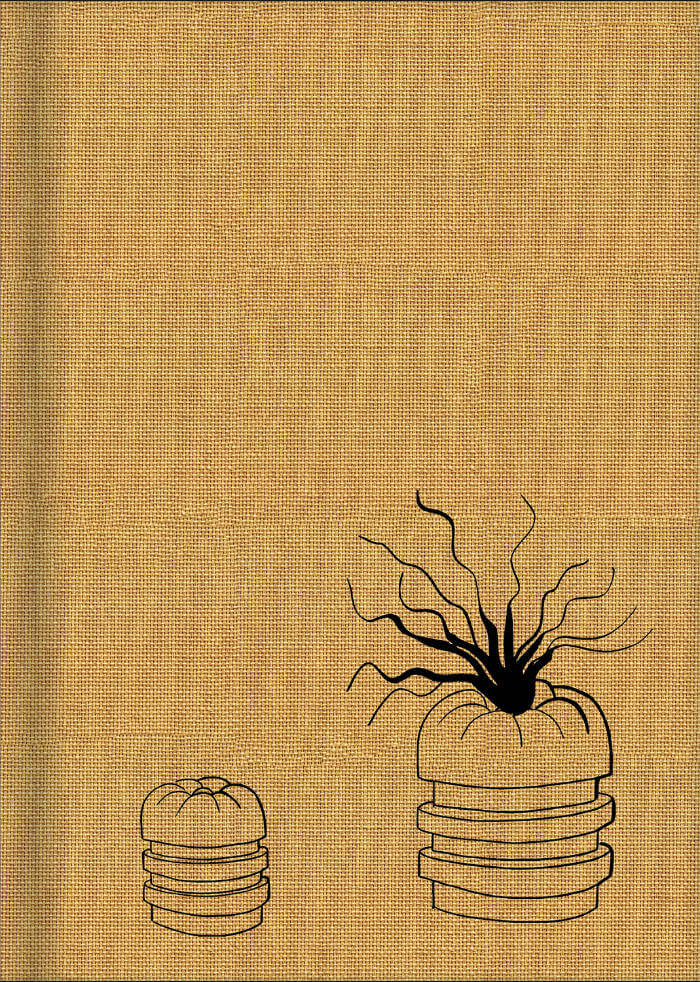
Elika Hedayat
First monograph of the Franco-Iranian artist.
This monographic catalogue looks back over the first 15 years of work by Iranian artist Elika Hedayat through more than 110 reproductions. Two of these are on a 1:1 scale, and a detailed set offers a comparison of the dimensions of the works in relation to each other.
Françoise Docquiert introduces the issues at stake in her practice with an essay, complemented by an interview with Joana P.R. Neves.
"Elika is a Parisian-Iranian artist. This cultural blend is slightly ironic though very significant, as it nourishes her artistic work and practice. Inspired by her childhood, her life, and the violence in her native country, she makes films, videos, and drawings always filled with beauty, scathing humour and cruelty." - Annette Messager
Born 1979 in Tehran, Elika Hedayat lives and works between Paris and Tehran. Arriving in France in 2004, she was admitted to the École Nationale Supérieure des Beaux-Arts in Paris in Annette Messager's studio, from wich she graduated with the Jury's congratulations in 2008.
For her works, Elika Hedyat often uses testimonies and experimental documentaries stage in a dreamlike and imaginary universe. Her stories are contemporary and her characters are real. All of her works revisits historical references, transferring them to the field of personnal experience, mainly using the various possibilities of her repertoire as a narrative document and memory retrieval tool. Reality, memory and imagination come together in a personal story under different forms : drawing, video, documentary, painting and performance.
Text by Françoise Docquiert.
Interview with Elika Hedayat by Joana P. R. Neves.